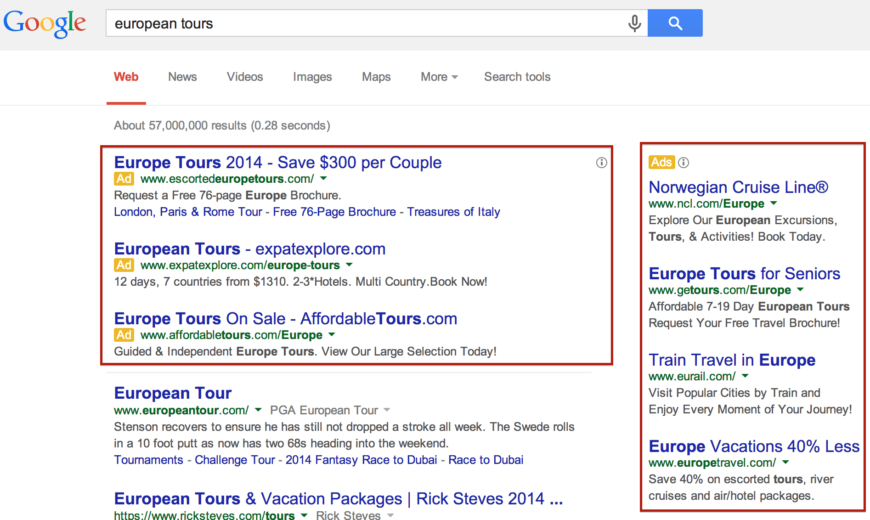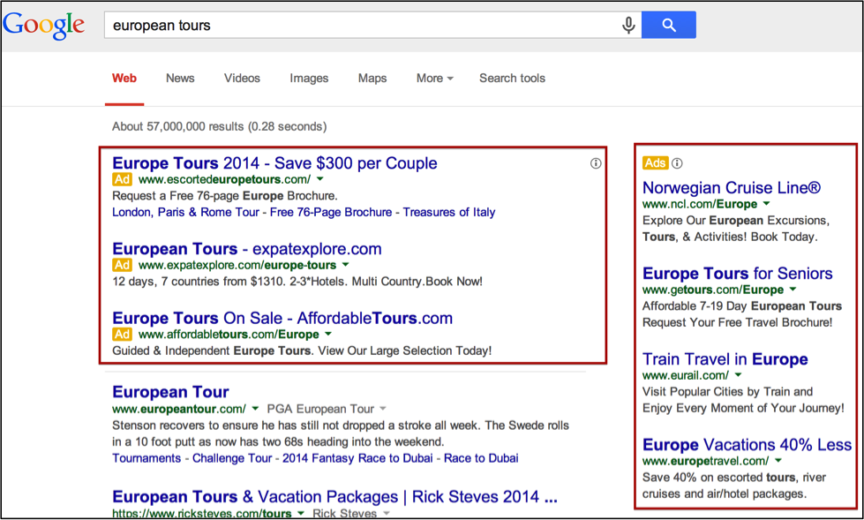If you’re planning on running a pay per click (PPC) campaign, and you’d like to hire an agency this guide is for you. I hope to show you how pay per click marketing works, and how you can contribute to the relationship in a way that will help you make the most money. I’ve broken this post into three parts:
1. What is Pay Per Click Marketing?
2. What is the Key to Winning at Pay Per Click?
3. Tips Specifically for Clients
What is Pay Per Click Marketing?
Pay per click marketing is most commonly done on search engines, so we’ll use them as a point of reference. The most well known pay per click marketing platform is Google AdWords. Other search engines support pay per click platforms as well, such as Bing and Baidu*.
*Site owned and operated by the author.
Search engines allow us to advertise on the search results pages. For example, in the image below you can see the ads on the top and to the right of the page.
The great thing about pay per click ads is choosing the keywords for which your ads are triggered. Each time a user clicks your ad you pay a fee. This allows you to tailor your ads to specific audiences.
But keywords aren’t the only variable you can control. You can also adjust your ad campaign based on other factors. For example, you can control:
- Negative keywords – Keywords that you specify which will NOT trigger ads. For example, if you are running an ad campaign for “European tours” and find that the crowd looking for “luxury European tours” is not likely to buy your more economical tour packages, you could enter “luxury” as a negative keyword. Your ad would no longer show up for any search phrases that contain “luxury”.
- Geography – You may choose to advertise only in certain countries or cities.
- Time – You may choose to only advertise during a certain part of the day or you might decide not to run ads on weekends.
Besides controlling for the factors mentioned above, there are many other factors to manipulate, namely:
- Bids – The maximum price you are willing to pay for each keyword.
- Ad Creatives – You get to write your own ads. You can test different ad text to learn which promotions and benefits consumers respond to best.
- Account Structure – You can organize your account in terms of themes, which should make it easier for you to manage. Specifically, ads and keywords are held in “ad groups” and ad groups are in turn held in larger “campaigns.”
- Website – Of course, you can control your website too. Pay per click marketers often create a standalone “landing page”, which provides website visitors with content highly focused on getting them to convert. Standalone landing pages are particularly useful in lead generation campaigns.
- Analytics – You can control how data is collected. This includes data from the ad platform, as well as from your own website.
To learn the lingo used by pay per click marketers, I suggest reading this PPC Hero guide.
What is The Key to Winning at Pay Per Click?
As you can see from the factors above, pay per click marketing can get very complex. Even a campaign for a small business may have a thousand keywords, multiple ads and several competitors all vying for business.
Pay per click is extremely competitive! Lucky for the little guys, it’s not always the biggest or strongest that wins. In pay per click, the key is to be smart. Marketers with a more robust methodology, greater creativity, better analytical skills and more experience are likely to gain an edge on the competition.
I believe in the following keys to success:
1) Have a great team
A great PPC team will meet the following requirements:
- A strong understanding of the marketing process. It may come as a surprise, but there are pay per click ‘marketers’ that can’t even understand a basic marketing plan.
- Lots of experience with the platform(s). Remember that doesn’t always mean Google.
- Great writing ability. For creating ads and landing pages, good writing skills will go a long way.
- Excellent analytical abilities and a strong understanding of statistics.
- If landing page creation is necessary, someone proficient in user experience and design is also required.
- Great communication skills are essential as the pay per click team will need to communicate with other people who may be unfamiliar to the industry.
2) Believe in the value of data
In pay per click, data is king! The team needs to believe in how important data is, and use it to make informed decisions. Great pay per click marketers tend to be big data nerds.
3) Constantly test
Since pay per click marketing generates loads of data on user behavior, and does so very quickly, it’s an excellent platform for iterative testing. It’s essential to test landing pages, ads, keywords and other factors. I’d also advise testing broader concepts, such as your business pricing model or new potential services.
Tips Specifically for Clients
If you are the client I have the following tips based upon my experience across a wide variety of industries.
1) Focus on the most important issue first.
Pay per click marketing produces so much data that it can be bewildering. It will always be easy to find little mistakes, even for a mature campaign. The tendency can be to try to perfect it, but I can assure you that perfection is not the goal.
The goal should be to constantly improve the campaign. There’s always room for improvement – no pay per click campaign in the world is an exception.
So choose the area for which there is likely to be the biggest return on investment and tackle it first, then move on to the next biggest, etc. Experienced pay per click managers should have a good idea about what to do first, but your insights are valuable. In most cases, the PPC manager should have a lot more experience with pay per click marketing, but the client will always understand their industry and clientele much better.
That being said, what are usually the most important issues? This is a tricky question to answer because it can vary so much, but here are some examples:
- Adding negative keywords based on search queries that are clearly irrelevant.
- Fixing major problems on the website that stop people from converting.
- Reviewing keyword topics to make sure no themes are missing.
- Making sure that ad messaging is consistent with the landing page content.
- Adjusting bids on the keywords that have the highest spends.
2) Share data – lots of it!
I’ll say it again, data is king! Pay per click marketers thrive on data. If they only have access to the data from the paid search platform, they can optimize the campaign to send more people to your website. That’s only the start though. If they also have access to data on how consumers behave on your website, they can optimize the campaign to make more sales. To compare to a brick-and-mortar store, that’s the difference between foot traffic in your store and money in your bank.
Much data is available through the web analytics platform, but not all information can be captured online. Information from your sales/customer support team and other offline data sources can be extremely useful as well.
3) Understand which data is actionable
A campaign will have a lot of data, but not all of it is actionable. In order to make decisions, you need to have enough data to see trends. Sometimes there just isn’t enough data to do so. For example, if you have a keyword that had 45 impressions, 3 clicks and no sales, is it a bad keyword? It’s tough to tell. In this case, more data is required. Some ways of getting the data include:
• Allowing ads for that keyword to run longer.
• Choosing an ad group, or a group of similar keywords and view the aggregate data.
You may also choose to make a decision based on a logical guess, but be careful not to overextend.
4) Make sure you share the same goals.
Make sure the pay per click team knows exactly what your goals are. Is your goal to maximize revenue given a set budget? Or is it to gain valuable data about the market first? Or is it to increase brand awareness? Or are there multiple goals? These goals vary and should result in different strategies. Here are some examples of goals stated clearly:
• Achieve 40 leads per month while not exceeding a cost-per-lead of 45 USD.
• Achieve the maximum sales revenue possible while spending no more than 8,000 USD on ads.
Final Thoughts
I left out many details for this guide, but I hope it provides clients who are new to pay per click the information they need. Do you have any tips of your own to add?





